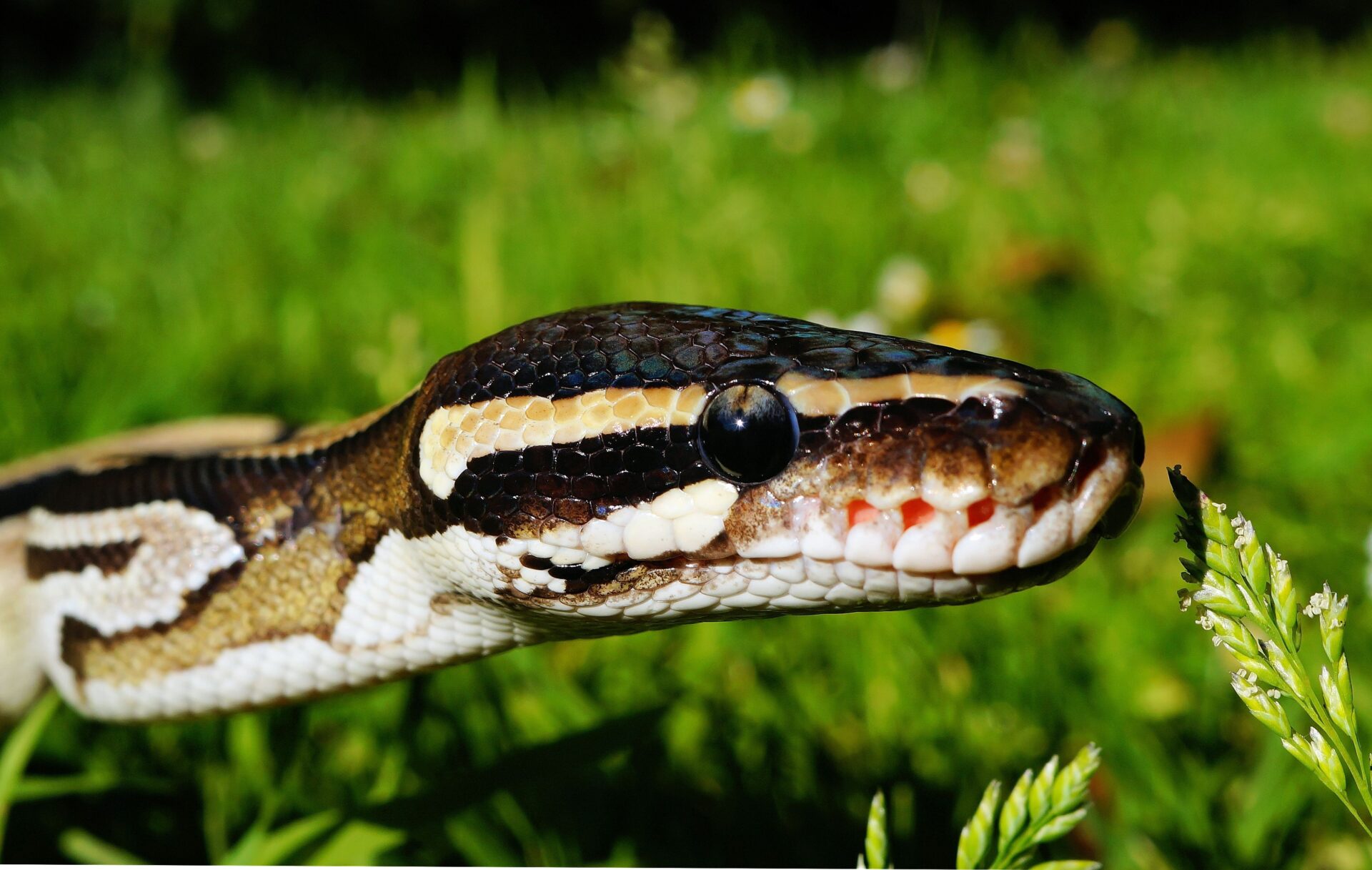Can a ball python kill you? This is a question that many people have been asking lately. Ball pythons are among the most popular pet snakes in the world, and there has been a great deal of debate about whether they can be dangerous to their owners. In this article, we will explore the potential risks associated with owning a ball python and answer the question of whether or not a ball python can kill you.No, Ball Pythons cannot kill humans.
Are Ball Pythons Poisonous?
Ball pythons are non-venomous snakes, meaning that they are not poisonous and are harmless to humans. While ball pythons do have teeth, their bite is considered to be relatively harmless due to the lack of venom. They may cause a slight pinch when they bite, but it is nothing compared to the pain caused by a venomous snake bite. Ball pythons are typically docile creatures and will rarely ever bite unless they feel threatened or scared.
When it comes to handling ball pythons, it is important to be gentle and avoid sudden movements so that the snake does not become frightened or agitated. It is also important to keep your hands away from its head, as this can cause stress for the snake and lead to an aggressive response. If a ball python does feel threatened, it will coil itself up in a defensive posture and may even hiss at you in order to scare you away.
Although ball pythons are not venomous, they still belong in the wild and should never be handled without proper care and caution. It is important for owners of ball pythons to understand the basic needs of these animals in order to ensure their health and safety. In addition, because of their size, ball pythons should only be handled by adults who understand how to properly handle them without causing harm or distress.
Overall, while ball pythons may seem intimidating due to their size, they are actually quite gentle creatures that pose no threat of poison or danger when handled with care and respect.
Potential Dangers of a Ball Python Bite
A ball python bite may not be as serious as a venomous snake bite, but it can still cause injury and even infection. There is always a risk of infection when dealing with any animal that carries bacteria, so it is important to take precautions when handling a ball python. While there are few reports of serious complications from ball python bites, there are some potential dangers that should be considered.
The most common danger associated with a ball python bite is the risk of infection. The mouth of any animal carries bacteria that can cause an infection, and this includes snakes. If you have been bitten by a ball python, it is important to wash the wound thoroughly with soap and warm water. If the wound does not appear to be healing properly or if you experience any signs of infection such as redness, swelling, or drainage from the wound, seek medical attention immediately.
Another potential danger associated with a ball python bite is tissue damage. Because snakes have sharp teeth and powerful jaws, they can cause deep puncture wounds or even crush tissue in their grip. This type of injury can be extremely painful and may require medical attention to treat properly.
Finally, while rare, there is also the possibility that venom may be present in a ball python’s saliva. Depending on the species of snake involved, this could mean anything from minor irritation to more serious complications such as anaphylactic shock or paralysis if left untreated. If you experience any type of reaction after being bitten by a snake, seek medical attention immediately.
In conclusion, while rare, there are potential dangers associated with a ball python bite that should be taken seriously in order to prevent further injury or complications due to infection or venom exposure. It is important to take proper precautions when handling any type of reptile and seek medical attention if necessary following an incident involving a snakebite.
What to Do After a Ball Python Bite
If you’ve been bitten by a ball python, it’s important to take the appropriate steps to ensure your safety and the safety of others. First and foremost, remain calm. Do not attempt to pull the snake away from your body as this could cause further injuries. Instead, carefully remove the snake from your body by gently pushing it away from you. Once the snake has been removed, wash the bite area with soap and water. Apply an antiseptic to the wound and cover it with a clean bandage or gauze pad.
It is also important to seek medical attention as soon as possible, even if you don’t think you’re seriously injured. Ball pythons are nonvenomous snakes, but their bite can still cause infection or other serious complications if left untreated. Be sure to tell your doctor or healthcare provider that you were bitten by a snake so they can provide appropriate treatment, such as antibiotics or tetanus shots if necessary.
In addition to seeking medical attention, it is important to take additional safety precautions when handling ball pythons in order to prevent future bites. Make sure that you wear gloves when handling any snake and never leave children unattended with a ball python. It is also important to always keep your snake in an enclosure that is secure and escape-proof so that it cannot get out and potentially bite someone else.
Finally, make sure that you keep up with regular veterinary care for your ball python in order to ensure its health and wellbeing. This includes routine physical exams as well as proper nutrition and housing for the animal. By taking these simple steps, you can reduce the risk of being bitten by your ball python in the future and keep yourself safe from harm.
Potentially Deadly Infections from a Ball Python Bite
Ball pythons are generally docile and non-aggressive snakes, but they can still bite if they feel threatened. Although these bites are usually harmless, they can potentially lead to some dangerous infections. A ball python bite can cause an infection in humans due to the bacteria that live in their mouths. It is important to take any snake bite seriously and seek medical attention as soon as possible.
The most common type of infection caused by a ball python bite is salmonellosis, which is caused by the Salmonella bacteria. These bacteria can cause symptoms such as diarrhea, fever, abdominal cramping, and vomiting. If left untreated, salmonellosis can lead to severe dehydration and even death in some cases. Other infections that can be caused by a ball python bite include streptococcal infection and staphylococcal infection. These infections can cause fever, chills, muscle aches, and rashes on the skin.
In addition to bacterial infections, a ball python bite can also cause viral infections such as rabies and herpes simplex virus (HSV). Both of these viruses can be deadly if left untreated and medical attention should be sought immediately if symptoms develop following a snake bite. In rare cases, a ball python bite may also transmit tetanus or botulism toxin from the saliva of the snake.
To prevent potentially deadly infections from a ball python bite, it is important to take preventive measures when handling these animals. Always wash your hands after handling snakes or any other reptile species and avoid direct contact with their mouths or saliva at all costs. If you do get bitten by a ball python, seek medical attention immediately as treatment may be necessary to prevent serious complications from developing.

Are Ball Pythons Aggressive?
Ball pythons are generally not considered to be aggressive animals. They are typically known to be quite docile, and they do not usually act aggressively towards humans or other animals. However, it is important to note that ball pythons can become stressed or frightened if they feel threatened, and in these situations they may become defensive or even bite. Therefore, it is important to handle them carefully and with respect in order to prevent any possible aggression from occurring.
When kept in captivity, ball pythons can become accustomed to regular handling and may even become quite tame. It is still important to remember that they can become stressed if handled too roughly or too frequently. It is also important to remember that ball pythons need a certain amount of privacy, so it is important not to disturb them when they are in their enclosures.
Overall, ball pythons are not usually considered to be an aggressive species of snake. However, it is still important to handle them with care and respect in order to prevent any possible aggression from occurring. With patience and proper care, ball pythons can make excellent pets for those who are willing to invest the time and energy into properly caring for them.
Can a Baby Ball Python Kill You?
No, a baby ball python is not capable of killing a human. Though they are non-venomous constrictors, their small size makes them unable to generate enough force to harm an adult human. In fact, the maximum size of a baby ball python is typically no more than three feet, making it impossible for the snake to constrict around and suffocate an adult.
These snakes are also quite docile in nature. They have been kept as pets for years, with many owners having no trouble handling their pet snake. While they can still bite if provoked or scared, their small size means their bite is unlikely to cause any serious injury.
Though it is important to remember that all snakes can cause harm if handled incorrectly, baby ball pythons pose very little threat to humans. Even when they reach adulthood and grow up to four or five feet in length, the risk of serious injury from them is very low.
It’s also important to note that these snakes require specialized care and handling due to their delicate nature. Any potential owner should be sure to research and understand the specific needs of this species before buying one as a pet. With proper care and respect, these snakes make wonderful companions that can live up to 20 years in captivity.
In conclusion, while there is always some risk involved when interacting with any animals, baby ball pythons are generally harmless and pose very little danger to humans.
Prevention of a Ball Python Encounter
In order to prevent a ball python encounter, it is important to take the necessary precautions. One of the first steps in prevention is to understand the environment where the ball python can be found. Ball pythons are found in tropical and subtropical regions and tend to prefer an environment with plenty of moisture, such as areas near water or moist soil. Knowing this information can help people avoid areas where ball pythons are likely to be present.
Another precaution that can be taken is to keep the area around your home clear of debris and clutter, as these provide ideal hiding spots for ball pythons. If you do find yourself in an area where a ball python may be present, it is important not to disturb or attempt to catch it. Instead, it is best to observe it from a safe distance and contact local authorities for assistance if needed.
Finally, if you own a pet reptile such as a snake or lizard, make sure that their enclosure is properly secured at all times so that they cannot escape and come into contact with any wild animals in the area. It is also important to educate yourself on proper care and handling for any pet reptiles so that you can provide them with a safe and healthy environment.
By following these simple steps, you can help ensure that any potential encounters with ball pythons are avoided altogether or handled safely by qualified professionals if needed.

Conclusion
In conclusion, while a ball python can cause serious harm to humans, it is very unlikely that it would be able to kill a person. Ball pythons are not particularly aggressive and the majority of bites occur when they are provoked or mishandled. People should always take proper precautions when handling any snake, as an accidental bite can still be very painful and even dangerous if not treated quickly. It is also important to remember that ball pythons should never be released into the wild as they do not belong there.
Overall, while the potential for a ball python to kill someone is extremely low, it is important to remember that all snakes are capable of causing harm and should be treated with respect at all times.




